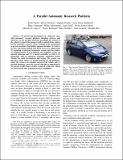A Parallel Autonomy Research Platform
Author(s)
Pendelton, Scott Drew; Andersen, Hans; Ang, Marcelo H., Jr.; Naser, Felix; Dorhout, David Lee; Proulx, Stephen; Schwarting, Wilko; Paull, Liam; Alonso Mora, Javier; Karaman, Sertac; Tedrake, Russell L; Leonard, John J; Rus, Daniela L; ... Show more Show less
DownloadMain Article (4.891Mb)
OPEN_ACCESS_POLICY
Open Access Policy
Creative Commons Attribution-Noncommercial-Share Alike
Terms of use
Metadata
Show full item recordAbstract
We present the development of a full-scale “parallel autonomy” research platform including software and hardware. In the parallel autonomy paradigm, the control of the vehicle is shared; the human is still in control of the vehicle, but the autonomy system is always running in the background to prevent accidents. Our holistic approach includes: (1) a driveby-wire conversion method only based on reverse engineering,
(2) mounting of relatively inexpensive sensors onto the vehicle, (3) implementation of a localization and mapping system, (4) obstacle detection and (5) a shared controller as well as (6) integration with an advanced autonomy simulation system (Drake) for rapid development and testing. The system can operate in three modes: (a) manual driving, (b) full autonomy, where the system is in complete control of the vehicle and (c) parallel autonomy, where the shared controller is implemented. We present results from extensive testing of a full-scale vehicle on closed tracks that demonstrate these capabilities.
Date issued
2017-06Department
Massachusetts Institute of Technology. Computer Science and Artificial Intelligence Laboratory; Massachusetts Institute of Technology. Department of Electrical Engineering and Computer ScienceJournal
2017 IEEE Intelligent Vehicles Symposium
Publisher
Institute of Electrical and Electronics Engineers (IEEE)
Citation
Naser, Felix et al. "A Parallel Autonomy Research Platform." 2017 IEEE Intelligent Vehicles Symposium. 11-14 June, 2017, Redondo Beach, CA, USA, IEEE, 2017.
Version: Author's final manuscript